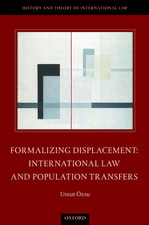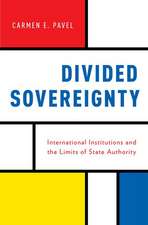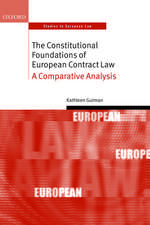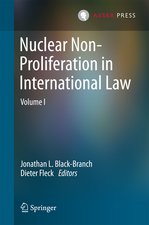The Function of Public International Law
Autor Jan Anne Vosen Limba Engleză Hardback – 5 mar 2013
Preț: 647.59 lei
Preț vechi: 761.87 lei
-15% Nou
Puncte Express: 971
Preț estimativ în valută:
123.98€ • 129.36$ • 103.92£
123.98€ • 129.36$ • 103.92£
Carte tipărită la comandă
Livrare economică 12-26 martie
Preluare comenzi: 021 569.72.76
Specificații
ISBN-13: 9789067048606
ISBN-10: 9067048607
Pagini: 316
Ilustrații: X, 304 p.
Dimensiuni: 155 x 235 x 23 mm
Greutate: 0.62 kg
Ediția:2013
Editura: T.M.C. Asser Press
Colecția T.M.C. Asser Press
Locul publicării:The Hague, Germany
ISBN-10: 9067048607
Pagini: 316
Ilustrații: X, 304 p.
Dimensiuni: 155 x 235 x 23 mm
Greutate: 0.62 kg
Ediția:2013
Editura: T.M.C. Asser Press
Colecția T.M.C. Asser Press
Locul publicării:The Hague, Germany
Public țintă
ResearchCuprins
Introduction.- Introduction to Part I.- The Framework of Obligation and the Framework of Authorization in the Case of the S.S. “Lotus” and in Legality of the Threat or Use of Nuclear Weapons.- The Framework of Obligation and the Framework of Authorization in General Theory of Law.- The Framework of Obligation and the Framework of Authorization in Theory of Public International Law.- Conclusion to Part I.- Introduction to Part II.- The Concept of General Principles of Law Situated within the Framework of Obligation and the Framework of Authorization.- The Concept of Conventional International Law Situated within the Framework of Obligation and the Framework of Authorization.- The Concept of Customary International Law Situated within the Framework of Obligation and the Framework of Authorization.- Conclusion to Part II.- Introduction to Part III.- The Concept of International Institutions Situated within the Framework of Obligation and the Framework of Authorization.- The Concept ofJus Cogens and the Concept of Obligation Erga Omnes Situated within the Framework of Obligation and the Framework of Authorization.- Conclusion to Part III.- Conclusion : The Concept of Public International Law as the Constituting of International Society Pursuant to Practical Reasoning.
Textul de pe ultima copertă
This book addresses fundamental aspects of the concept of public international law in both theory and practice. The argument developed by the author is that, underlying the traditional, horizontal, structure of public international law, a vertical structure of the concept of law may be discerned. This vertical structure is seen unfolding into two, mutually exclusive, frameworks: a framework of obligation, accounting for obligations, and a framework of authorization, accounting for rights. The problem then arising is that a concept of public international law which only admits either rights or obligations cannot be regarded as coherent. The author, however, takes and substantiates the position that coherence can be achieved by suppressing the mutual exclusivity of both frameworks. This move paves the way to formulating the function of public international law in terms of the constituting of international society.
Since in public international law the theoretical aspects profoundly affect practice, this book is not only of interest to academics, but also for practitioners, such as officials of foreign offices and international institutions.
Dr. Jan-Anne Vos wrote this book as a senior researcher at the T.M.C. Asser Instituut, The Hague, The Netherlands.
Since in public international law the theoretical aspects profoundly affect practice, this book is not only of interest to academics, but also for practitioners, such as officials of foreign offices and international institutions.
Dr. Jan-Anne Vos wrote this book as a senior researcher at the T.M.C. Asser Instituut, The Hague, The Netherlands.
Caracteristici
Addresses a theoretical gap Builds a bridge between main stream and critical approaches Provides a background explanation for current events Includes supplementary material: sn.pub/extras




















